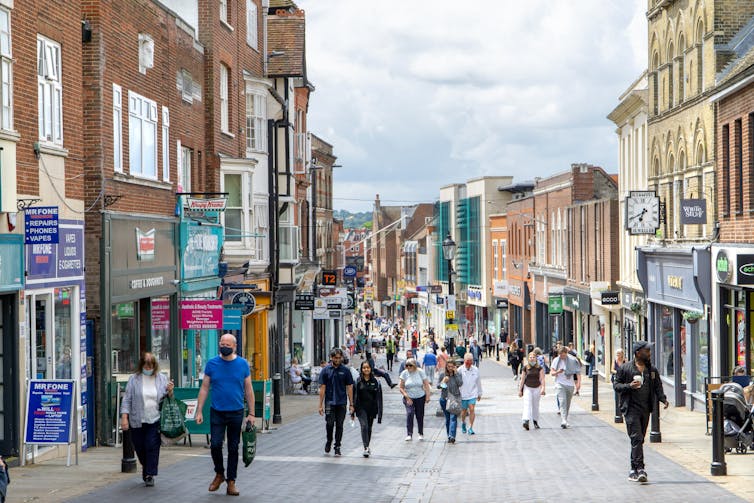On the second anniversary of Britain first going into lockdown, and with the country now opening up, this is a good opportunity to make sense of what happened in the pandemic, what it meant, and what needs to be done next.
Some of the pandemic’s patterns are now all too clear. COVID’s visible harms concentrated on the elderly, over 150,000 of whom lost their lives in the UK. But there have also been huge invisible harms, largely concentrated on the young. The pandemic has mainly been reported on in terms of health and economic effects, but in the long run the social impacts may be just as serious.
Globally, the last two years brought the sharpest retreat of human development and equality in living memory. Hundreds of millions have suffered with mental health problems and just as many with stark cuts in income. Inequality has widened in the UK, with people on lower incomes seeing a significant drop in living standards. Mental health and wellbeing have been adversely affected, especially in children.
Rahm Emanuel, an adviser to Barack Obama and later mayor of Chicago, famously said after the 2008 financial crisis that “you never want a serious crisis to go to waste”. With that in mind, it’s not too late to use the rest of 2022 to address the scarring effects of the crisis and their underlying issues – so here are five things the UK needs to prioritise.
1. Help children catch up and recover
Many children have fallen behind in terms of academic achievement, socialisation and confidence as a result of missing out on school.
One study found that during school closures 20% of children were doing less than an hour of home learning each day. With education moving online, unequal access to technology played a part: one in eight school children had either just a mobile phone or no device at all to use to learn at home.
A large number – though it’s hard to say precisely how many – have not returned to school after the lockdowns. This summer we need a much richer offering of chances to do sports, arts and have fun alongside more traditional academic catch-up opportunities and tutoring.

Monkey Business Images/Shutterstock
2. Address mental health needs
From March 2020, the prevalence of anxiety and depression across the UK rose sharply, having remained relatively static over the last 30 years. Over a quarter of the population experienced “clinically significant” levels of distress during the pandemic and the same proportion of 18-year-olds considered self-harm.
Attention now needs to turn to strategies for supporting mental health across the population and not focus on just the most acute needs. There are good examples of what could be done. The Australian government, for example, has provided a package of mental health support measures, including a 24/7 phone-counselling service, job opportunities for Australians to be trained as counsellors to meet the need, and funding for online and peer-support tools.
3. Look after health and care staff
Frontline NHS and care home staff bore the brunt of the crisis, and many are now burnt out. The latest NHS Staff Survey, which covered the first six months of the pandemic, found that 44% of staff reported feeling unwell as a result of work-related stress, the highest rate recorded in the last five years. A British Medical Association survey in September 2021 found that 43% of respondents were considering early retirement.
There’s also a much bigger strategic challenge of addressing unfair pay. Care workers, for example, are drastically underpaid compared to other workers with similar skills, with the majority struggling to pay for essentials. Wage top-ups or higher minimum wages for particular sectors (like care) are potential solutions.
4. Reconsider urban design
COVID has changed how and where we work. Data gathered from mobile devices shows that British people on average are spending 27% less time at their physical places of work compared to before the pandemic. Over 80% of UK workers say they would prefer to work remotely at least one day per week. There’s likely to be a long-term shift away from five-day working in offices.
Urban centres were therefore quieter during the pandemic, and while footfall has recovered somewhat, it’s still significantly down in major cities such as London, Manchester, Cardiff and Birmingham. It’s too soon to say which places will suffer lasting scarring effects – but it’s already clear that land use may have to change radically.
5. Fix failures of governance
The crisis revealed many failings of governance, some at the very top. The core of government floundered. The problem wasn’t just the abuse of rules, but also included failures in how science was organised and how data was used, which the upcoming UK COVID inquiry will examine.
A particularly striking failure was the lack of coordination between the different levels of UK government, from Whitehall to the devolved administrations and local government. For example, having England, Wales, Scotland and Northern Ireland each introduce their own restrictions was confusing and may have undermined public compliance with control measures.
Other countries have well-developed systems to help levels of government work together; these were largely lacking in the UK. Fixing this now needs to be a priority.

cktravels.com/Shutterstock
These are just a few of the issues that need to feature prominently in recovery plans. There are plenty of other challenges to consider too, from the distrust many communities felt around vaccines, to the rise in domestic violence, to the gender imbalances that left many women bearing the brunt of the crisis – looking after children sent home from school as well as juggling jobs and more.
We know that the costs of the crisis will be with us for many years to come. Over 11 million were on furlough. The cost to taxpayers is estimated at £315-410 billion (or between £4,700 and £6,100 per person). But other costs will be less visible. The risk now is that our understandable relief at the pandemic entering its final phases shuts off the willingness to address the harms it leaves behind: that we will essentially have wasted the crisis.
On Thursday March 24, to mark the second anniversary of the UK’s first lockdown The Conversation’s partner organisation, the International Public Policy Observatory, is staging a major online event bringing together policymakers, scientists and other experts to explore the social impacts of the pandemic and how best to recover from them. For more details of this free event, please click here.
![]()
Geoff Mulgan receives funding from the Economic and Social Research Council for the International Public Policy Observatory (IPPO).
Source: TheConversation


